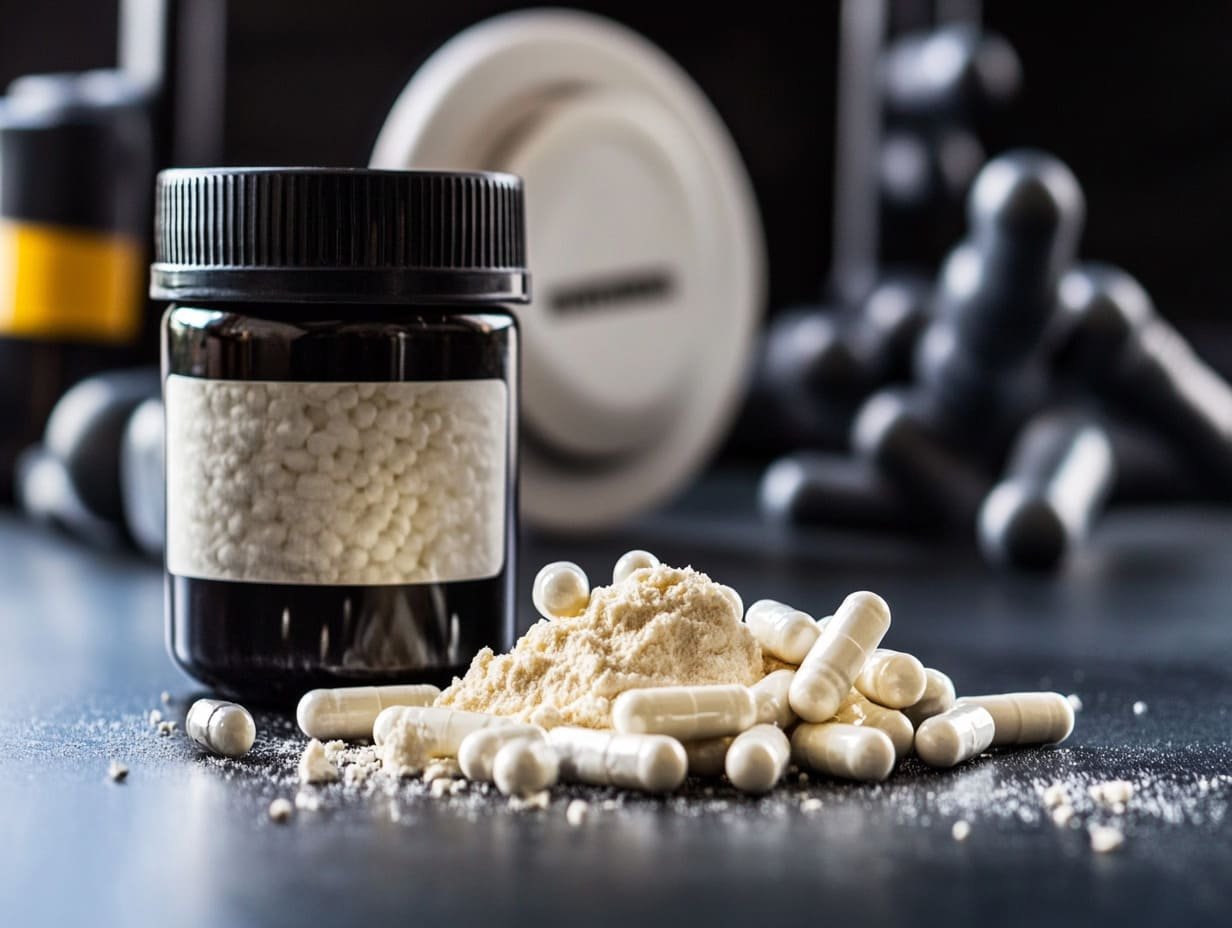Creatine is one of the most widely used and researched dietary supplements in the fitness and wellness community. It has gained popularity among professional athletes, bodybuilders, and casual gym-goers alike.
But what exactly is creatine, and why has it become so mainstream?
The Buzz Around Creatine: Why It's So Popular
Creatine is a naturally occurring compound found in small amounts in certain foods, such as red meat and fish, and synthesized in the body from amino acids. It is stored in muscles as phosphocreatine and plays a crucial role in producing adenosine triphosphate (ATP), the primary energy carrier in cells.
The growing popularity of creatine is driven by its well-documented ability to enhance physical performance, particularly in high-intensity, short-duration activities like weightlifting and sprinting.
Many athletes and fitness enthusiasts endorse creatine because it helps them train harder, recover faster, and achieve their fitness goals more efficiently.
The science backing these claims is robust, with numerous studies demonstrating its effectiveness and safety.
If you're interested in improving your health through good habits, healthy eating, and supplementation, click here and sign up for our newsletter. Get firsthand information on how to achieve your health goals.
Benefits of Creatine
Benefit 1: Enhanced Athletic Performance
Creatine increases the phosphocreatine stores in muscles, allowing for more rapid regeneration of ATP during high-intensity exercise. This increase in available energy can enhance performance in short, explosive movements.
A study published in the Journal of Applied Physiology found that creatine supplementation led to a 5-15% improvement in performance during activities such as sprinting and weightlifting .
The study measured the performance of athletes over a six-week period and reported a significant increase in muscle power output, with an average improvement of 8% in high-intensity exercise bouts .
Benefit 2: Increased Muscle Mass
Creatine promotes muscle growth by increasing water content within muscle cells, leading to an increase in muscle size and the stimulation of muscle protein synthesis.
A review in the International Journal of Sport Nutrition and Exercise Metabolism concluded that creatine supplementation could enhance muscle mass gains during resistance training programs .
The review analyzed multiple studies, reporting an average gain of 2 kg of muscle mass over 8 weeks in individuals supplementing with creatine, compared to those who did not take the supplement .
Benefit 3: Improved Recovery and Reduced Fatigue
Creatine helps reduce muscle cell damage and inflammation following exhaustive exercise, which aids in quicker recovery.
A study in the Journal of Strength and Conditioning Research demonstrated that athletes taking creatine experienced less muscle soreness and inflammation after intense workouts .
Participants who took creatine reported a 50% reduction in muscle soreness 24 hours post-exercise compared to the placebo group.
Benefit 4: Cognitive Enhancement
Creatine supplementation may improve brain function by increasing phosphocreatine reserves in the brain, which is crucial for ATP production.
A study published in the journal Psychopharmacology found that creatine improved memory and cognitive performance in tasks requiring quick thinking and problem-solving .
Participants taking creatine showed a 20% improvement in short-term memory tests and a 30% improvement in tasks requiring mental processing speed.
Benefit 5: Support in Neurological Conditions
Creatine may offer therapeutic benefits in treating certain neurological diseases by providing neuroprotective effects.
Research published in The Lancet Neurology suggested that creatine supplementation could slow the progression of diseases like Parkinson's and Huntington's.
In animal models, creatine administration reduced neurodegeneration markers by 40%, providing a promising avenue for future research in humans .

The Impact of These Benefits on Daily Life
The cumulative benefits of creatine can lead to improved athletic performance, enhanced muscle growth, and potentially improved cognitive function, all contributing to a better quality of life.
Regular use can translate to more effective workouts, faster recovery times, and a greater sense of well-being.
For many, this means not just physical improvements but also increased confidence and motivation to maintain an active lifestyle.
Who Should Consider Taking Creatine?
Creatine is suitable for a wide range of individuals, from athletes looking to improve performance to older adults seeking to maintain muscle mass and cognitive function.
However, its benefits are most pronounced in activities that involve short, explosive bursts of energy.
A study in the Journal of the International Society of Sports Nutrition examined the effects of creatine across different age groups and found that both younger and older adults benefited from supplementation .
The study reported that older adults experienced a 10% improvement in muscle strength and cognitive function after 12 weeks of creatine use.
Limitations to Consider
While creatine is effective, it's essential to manage expectations. It is not a magic pill that will yield overnight results. Benefits typically manifest over weeks of consistent use combined with regular exercise and a balanced diet.
Additionally, individual responses to creatine can vary, and not everyone may experience the same level of improvement.
Choosing the Right Creatine: It's Not All the Same
When selecting a creatine supplement, quality is paramount. Here are key factors to consider:
- Purity: Look for creatine monohydrate, the most researched and proven form of creatine. Products should be tested for purity and free from contaminants.
- Reputation: Choose brands with positive reviews and a track record of transparency and quality control.
- Solubility: Opt for creatine that dissolves easily in water to ensure better absorption and reduce gastrointestinal discomfort.
What to Avoid
- Unproven Forms: Avoid supplements that boast unverified forms of creatine with no scientific backing.
- Additives: Steer clear of products with unnecessary fillers, artificial colors, or sweeteners.

Best Creatine Supplements
For those interested in top-quality creatine supplements, here's a curated list of the best products available today, all offering superior quality at an accessible price.
- Optimum Nutrition Micronized Creatine Monohydrate Powder:
This product offers pure creatine monohydrate in a micronized form, which enhances solubility and absorption.
Pros: High purity, no added ingredients, trusted brand. - MuscleTech Platinum 100% Creatine:
Known for its high-quality creatine monohydrate, this supplement supports increased strength and power.
Pros: Clinically studied formula, budget-friendly, no fillers. - Cellucor COR-Performance Creatine:
This creatine supplement is designed to improve athletic performance and increase muscle mass.
Pros: Micronized for better mixing, gluten-free, affordable. - BulkSupplements Creatine Monohydrate Powder:
Offers pure creatine monohydrate with no additives, suitable for customizing your dosage.
Pros: Economical, lab-tested for purity, great for bulk users. - Creatine HMB by Transparent Labs:
Combines creatine with HMB (beta-hydroxy beta-methylbutyrate) for enhanced muscle recovery and strength.
Pros: Added benefits of HMB, no artificial sweeteners, third-party tested. - Klean Athlete Klean Creatine:
Designed for athletes, this supplement supports muscle strength, power, and endurance.
Pros: NSF Certified for Sport, pure creatine monohydrate, no added sugars. - Thorne Research Creatine:
Offers high-quality creatine monohydrate to support energy production during intense workouts.
Pros: Tested for contaminants, free from allergens, reliable brand. - RSP Nutrition Creatine Monohydrate:
A straightforward and effective creatine supplement to boost performance and recovery.
Pros: Micronized for better absorption, unflavored, value for money. - Beast Sports Nutrition Creature Creatine Complex:
A unique blend of five advanced forms of creatine designed to fuel muscles for maximum performance.
Pros: Enhanced formula, supports muscle growth, good taste. - Nutricost Creatine Monohydrate:
Offers a simple yet effective creatine solution to support muscle gains and strength.
Pros: Affordable, micronized for better solubility, no fillers.
These supplements represent some of the best options available, offering a range of benefits tailored to different preferences and needs.
Always ensure you choose a product that aligns with your dietary requirements and fitness goals.
Top 10 Frequently Asked Questions About Creatine
- What is creatine? Creatine is a naturally occurring compound that helps produce ATP, the primary energy carrier in cells.
- Is creatine safe? Yes, numerous studies have shown that creatine is safe for long-term use when taken at recommended dosages.
- How should I take creatine? Creatine can be taken in cycles or continuously. A common approach is to start with a loading phase (20g/day for 5 days) followed by a maintenance phase (3-5g/day).
- Does creatine cause weight gain? Creatine can cause an increase in body weight due to water retention in muscles, but this is often temporary.
- Can I take creatine with other supplements? Yes, creatine is commonly taken with protein powders, pre-workouts, and other supplements without adverse effects.
- Does creatine affect the kidneys? Studies show that creatine does not affect kidney health in healthy individuals. However, those with pre-existing kidney conditions should consult a doctor.
- Can women take creatine? Absolutely, women can benefit from creatine just as much as men, with improvements in strength and muscle mass.
- Is creatine vegan? While creatine is naturally found in animal products, synthetic creatine supplements are vegan-friendly.
- When is the best time to take creatine? Creatine can be taken at any time of the day, but some prefer post-workout for convenience.
- What happens if I stop taking creatine? Upon cessation, muscle creatine levels will gradually return to baseline, but no adverse effects occur from stopping supplementation.
Your body and good health are built over time through consistent effort. Remember, achieving your fitness goals takes patience and dedication.
If you need guidance, sign up for our newsletter for tips and support on your health journey!

